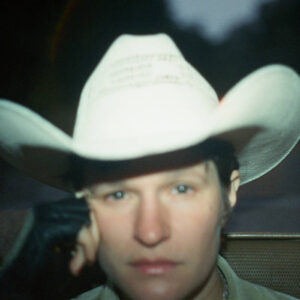Bright future
By: Elizabeth Hildebrandt, Staff Writer

‘Let no machine eat away our dream’ is a line from Adrianne Lenker’s latest album, Bright Future, and it is a sentiment that carries meaning throughout its 43 minute runtime. It fully embraces humanity, originality, and creativeness through Adrianne’s clever wordplay, heartbreaking songwriting, and appreciation for the organic. She states in a magazine interview, ‘I don’t want to fall into numbness or complacency or autopilot or be swallowed up by the machine or consume it until every bit of my original essence is gone, which I feel is happening to people’. She emphasizes nature, ideas, loving, and feeling above all else, and that affection seeps into every aspect of this album.
The first track ‘Real House’, is an ambient song of aching nostalgia addressed to Adrianne’s mother. She reminisces on moving into their first long-term home, noting the memories of the ‘purity of the air’ and braiding willow tree branches into crowns. ‘That love is all I want’, she says, and she shifts back to reality, as an unsure 31 year old who just needs the comfort of her mother. It’s a song about the loss of innocence, and even though it is about her specific experience it is a feeling known by all. It certainly sets the tone for the album with its heavy emotion, and this trend continues to the next track, ‘Sadness as a Gift’. In this song, Adrianne reflects on a past relationship, longing for reconnection but knowing that it’s better to let go and move on. She uses the seasons as a metaphor for love, coming and going but never consistent. She hopes that this person will write to her in the future, but acknowledges that they should take the ‘sadness as gift’, accepting that the relationship is over and at the same time being grateful for the experience of having it. Still, the pain is too heavy, but the only way to heal is moving on. Adrianne’s voice shines in this song, and pairs beautifully with the gentle acoustic guitar, piano and violin.
The tone switches with the third track, ‘Fool’, a more lighthearted-sounding song with twinkling guitars and playful background vocals. She tells the story of someone that she loves, but knows isn’t right for her. This person isn’t fully committed to her, and Adrianne just longs for something stable with them. She draws comparisons to other people in her life who have found that stability, and confesses that despite the uncertainty, she will love this person until she dies. The playful sound of the song reflects Adrianne’s romanticization of this person as a result of being so enamored by them, but her words are desperate and pleading. It’s a feeling that many people know, upholding the album’s emphasis on feeling emotion, even if that emotion might not be mutual.
‘No Machine’ is the next song on the album, and it emphasizes this idea of not being consumed by ‘the machine’. She writes about dragonflies, love, clouds, the wind and the ocean. It’s an embrace of love and a rejection of numbness, whether that love can be found in people, nature, or within. Similarly, the next song ‘Free Treasure’, is about the small pleasures in life that can be found for free. She sings about the richness of nature again, dancing, smelling good homemade food, sharing experiences, and the comfort that can be found in secure love.
The sixth track ‘Vampire Empire’ is a reimagined interpretation of Big Thief’s song by the same name, of which Lenker is also a part of. It’s a raw retelling of a relationship that has run its course, and although Adrianne is exhausted and can’t seem to stand it anymore, she cannot imagine her life without this person. The aggressive acoustic guitar and tense violin compliment this feeling, immersing the listener into the rage and frustration that she is feeling. Throughout the length of the album, Adrianne goes through the many different courses and stages of love, each a stark listening experience due to her accuracy in portrayal. The next song, ‘Evol’, plays with this idea of the different experiences of love through wordplay. She uses words and creates meaning out of how they sound backwards, highlighting the dichotomy in love.
The second half of the album incorporates religious themes in the songs “Candleflame” and ‘Already Lost’, the latter with beautiful layered vocals and the only song to include banjo, keeping with the folk-y feel of Adrianne’s work. ‘Donut Seam’ is a play on ‘don’t it seem’, and it reflects climate anxieties, with Adrianne stating ‘this whole world is dying’. Despite this though, she delivers the message that we should appreciate what we have now before it’s gone, especially the love in our lives while it is still alive. She reminisces more about love on ‘Cell Phone Says’ and ‘Ruined’, which is the final track on the album. It is another heartbreaking song about a past love, fresh in pain and fragility. Her breathy, aching voice stands out against the atmospheric instrumental, and its vulnerability marks a good end to the album. It is a sad ending, but it is also honest and a good testament to the album’s foundation.
Bright Future is definitely shaping up to be one of my favorite releases of the year, and I couldn’t recommend it enough to anyone who has previously been acquainted with Adrianne’s work, whether it is her solo content or work with Big Thief. I think there is something for everyone to find in this album because of how vulnerable it is, and that is partly what makes it so great. The instrumentals are something worth hearing too, and there are many unique-sounding songs on it. Overall, Bright Future is a monumental addition to Adrianne’s line of work, and I am very curious to see what she does next. For now though, I would highly recommend giving this album a listen.
